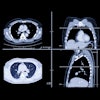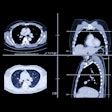
How often are individuals undergoing shared decision-making sessions when considering CT lung cancer screening? Perhaps more often than is documented, according to a study published April 16 in the Journal of the American College of Radiology.
More often than not, these conversations -- which are required by the U.S. Centers for Medicare and Medicaid Services (CMS) in order to receive reimbursement for CT lung cancer screening -- aren't noted in a patient's electronic health record.
"[Our] results suggest that electronic health record-documented shared decision-making in lung cancer screening practice is suboptimal, although rates are higher than reported in prior work," wrote a group led by Dr. Tina Tailor of Duke University in Durham, NC. "The higher self-reported shared decision-making rate [we] observed may suggest that clinicians are underdocumenting the service."
Both CMS and the U.S. Preventive Services Task Force (USPSTF) require shared decision-making for lung cancer screening. The conversation is supposed to include a number of Medicare-required components, including discussion of the use of a decision aid, the benefits and harms of lung cancer screening, the possibility of follow-up testing, the possibility of overdiagnosis or a false positive, the impact of comorbidities, radiation exposure and the importance of annual screening and quitting smoking.
Yet some research has shown that only 9% of individuals who are eligible for CT lung screening actually experience shared decision-making.
Tailor's group conducted a study that included 580 patients who underwent low-dose CT for lung cancer screening between February 2015 and June 2020 at four screening sites. The study's primary goal was to determine whether shared decision-making occurred and was documented in the patient's electronic health record.
The investigators found that only 41.9% of those patients who underwent low-dose CT for lung cancer screening had experienced shared decision-making that was documented in their electronic health record. More people (71.1%), however, self-reported shared decision-making conversations.
The authors also found the following:
- 55.6% of those patients with electronic health record-recorded shared decision-making conversations used a decision aid.
- 21.8% of documented shared decision-making encounters included all Medicare-designated components
- Those patients who were obese and current smokers were more likely to have shared decision-making conversations documented in their electronic health records.
- Nonpulmonary referring doctors were less likely to record shared decision-making conversations in a patient's record than pulmonary physicians.
Although the study results suggest that "shared decision-making for lung cancer screening is variably implemented and potentially discordant from the intent of the CMS and USPSTF guidelines," according to the group, it does show that perhaps these conversations are happening more than is evident, since they aren't being tracked.
Perhaps radiologists can help not only boost rates of shared decision-making conversations but also the recording of them.
"Given radiologists' expertise in low-dose CT interpretation, lung neoplasm detection, and screening-related risks such as radiation, they have a significant opportunity to help provide education before lung cancer screening and help in strategies for improving individuals' understanding of lung cancer screening results," Tailor and colleagues concluded.





















